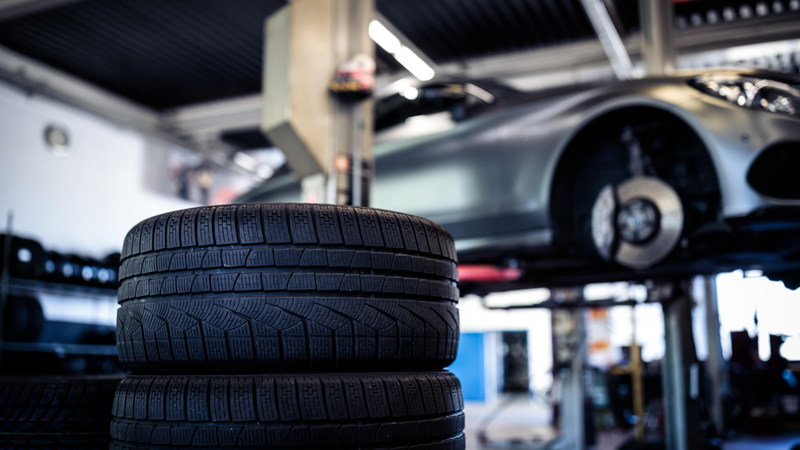
Unbalanced Tires: Symptoms & What You Can Do About It
Unbalanced tires can cause several issues for drivers; thus, it's essential to be aware of the most common symptoms and know how to solve them.
Unbalanced tires can cause various symptoms that affect a vehicle's overall performance. If you have tires out of balance, be prepared for a bumpy ride, uneven tire wear, and even damage to the suspension system.
At Creamery Tire Inc, our team of experts provides comprehensive tire service to help diagnose and solve any unbalanced tire symptoms. So, whether you're experiencing symptoms or just need a routine check-up, continue reading for a detailed guide to tire balancing problems.
Tires Out Of Balance: Symptoms to Keep in Mind
If you’re wondering how to tell if tires are out of balance, know that unbalanced tires show many noticeable symptoms to inform you about the issue. The main tires out of balance symptoms include:
- Vibration: Have you noticed any vibrations in the steering wheel, floorboard, or even the seat? This noise can be uncomfortable and distracting for drivers, and is often a sign your tires are out of order.
- Uneven Tire Wear: One of the most common unbalanced tire symptoms is uneven wear on the tires, which is often caused by constantly being out of alignment, leading to faster wear on specific areas of the tire.
- Poor Fuel Economy: An unbalanced car tire can also lead to poor fuel economy as the engine has to work harder to compensate for the imbalance. This can lead to higher fuel costs over time.
- Your Vehicle Pulls to One Side: Fourth on our list of symptoms of unbalanced tires is tires that are severely out of balance. Not fixing this problem ASAP can cause your vehicle to pull to one side while driving. This can be especially dangerous while driving at high speeds.
It’s important to note that balancing and wheel alignment are essential components of regular auto maintenance; however, each key component serves different unique purposes. Wheel alignment involves adjusting the angles of the tires to ensure they are aligned and make proper contact with the road, resulting in reduced tire balancing problems and increased life. On the other hand, a balanced wheel-tire assembly ensures a smoother ride, reduced tread wear, improved gas mileage, and reduced strain on various parts of your vehicle, saving you money in the long run.

What Causes Unbalanced Tires?
If you're wondering what causes unbalanced tires, know that the problem can be caused by several factors and can result in various symptoms. Some of the most common causes include:
- Internal Causes: Internal causes include imbalance weight distribution, bad driving habits, consistent stopping on the road, and worn-out or damaged components.
- External Causes: Unbalanced tires can also be caused by improper installation, uneven wear, road hazards, unbalanced wheels or rims, and incorrect inflation pressure.
It's important to be aware of the most common signs of unbalanced tires, such as a vibrating wheel, uneven tire wear, vehicle pulling to one side, and poor fuel economy. Regular tire balancing and maintenance can prevent symptoms of unbalanced wheels and extend their life for years to come.
How to Tell Which Tire is Out of Balance
Identifying which tire is out of balance can be done by observing specific signs and conducting a few simple tests. Common out-of-balance tires symptoms that may help you figure out the culprit are:
- Uneven tire wear
- Reduced life span of a tire
- Pulling to one side while driving
- Increased tire wear and damage
Other unbalanced wheels symptoms include unusual road noise, decreased fuel efficiency, poor road handling or stability, and impaired steering control.
How Often Should Tire Balancing Be Done?
Balancing should be done periodically to ensure the tire's proper functioning and prevent any problem from arising. The frequency of balancing depends on several factors, including the vehicle type, driving conditions, and the age of the tires (new/old). As a general guideline, it’s recommended to have your tires balanced every 6,000 to 8,000 miles or whenever you notice any symptoms.
To prevent tire balancing problems, it's essential to maintain proper tire inflation, have regular wheel alignments, and promptly replace worn or damaged tires. Regular inspections of the tires and wheels, including weights and balance, can also help catch any potential issues immediately.
Finally, it's always best to use high-quality, well-made tires and to have them balanced by a professional technician using modern equipment to ensure a smooth and safe drive.
Can You Drive With Your Tires Out of Balance?
Driving with unbalanced tires can be dangerous and cause significant wear and tear on the vehicle’s suspension system, such as vibrations in the steering wheel and seat, poor handling and stability, uneven tire wear, and increased road noise. Not only that, but it can also lead to decreased fuel efficiency, poor steering control, and reduced tire lifespan, costing you hefty repairs.
Instead of scratching your head thinking, "What will happen if your car wheels are unbalanced?" it's best not to drive at all in such a situation.
- How to Fix Unbalanced Tires: To fix unbalanced tires, have them balanced by a professional tire balancing service. A tire balancing service involves measuring the weight distribution of each tire and wheel assembly and adding weights to correct any imbalances. Balancing should be performed periodically, every 6,000 to 8,000 miles, as well as when replacing or rotating tires. Besides, if you notice any of the symptoms of an imbalanced tire, opt for it immediately.
Getting your tires balanced by a professional tire balancing service center offers several advantages. At Creamery Tire Inc, we are committed to providing the best service in the industry; you can be confident that your tires will be balanced accurately, efficiently, and on time.
Not only that, we pride ourselves on giving our customers a unique, no-appointments-necessary experience and never charging any hidden fees, so you can be sure that what you see is what you get.
So, trust us to give you peace of mind on the road and a safe, enjoyable driving experience. For more information, fill out the contact us form today, and our team will respond as soon as possible.
